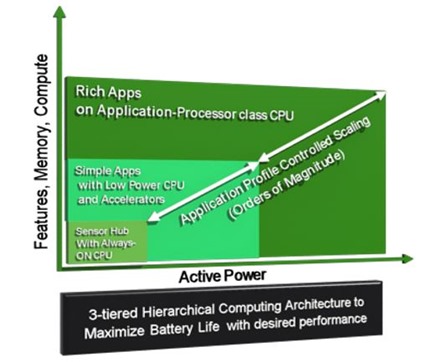With a new trend among leading manufacturers around the world, showing interest in the wearable device segment, the demand for hardware that’s more suited to the purpose is growing. Although the market for the segment still in its early stages, one Indian startup is surely taking promising steps in building chips meant for those devices. Hyderabad based Ineda Systems is attempting to pioneer a chip which will take wearable tech into the next stage.
With their innovative and first of its kind Wearable Processing Unit (WPU™), they are aiming to improve the five characteristics of any wearable devices aptly acronymed AEIOU. Those being,
- Always Listening to enable Contextual Computing
- Elastic Power & Performance Micro-Management
- Integrated Sensor & Connectivity Hub
- On-tap Performance for Compute-On-The-Go
- Ultra low power consumption

WPU™ is made possible with hierarchical computing, where multiple CPUs run independently or in unison to perform optimally at optimal power consumption under all possible levels of usage.
When you look back to a similar phase while the market slowly started shifting to mobile from PC, the use of same chip technologies was a major roadblock for the new devices which needed more advanced technologies to evolve into a usable computing device. Hence, the hardware evolved to fit the purpose.
Now is the time that perhaps marks the dawn of even more contextual and portable mobile computing. However, people who are used to charging their devices once every night, might want their wearable devices to last for even longer periods. Keeping that demand in mind, Ineda’s WPU™, which claims to operate up to 30 days in an always-on mode, is certainly a welcome for manufacturers and consumers alike.
The company will face competition from big names like Qualcomm and Intel. Intel has already made something similar named Quark aimed at similar segment. With ABI Research estimating a sale of 90 million wearable devices in the year of 2014, Ineda is sure to meet more contenders in the space.
Apart from the wearable segment they are also aiming for(that face similar challenges) the microservers which are used in data centers which is currently dominated by Seamicro (acquired by AMD).
The startup recently secured $17 million (Rs 102 Crores) in second round funding from Walden-Riverwood Ventures, Samsung Catalyst Fund, Qualcomm Ventures, IndusAge Partners and others. Adding their previous funding rounds, the total amount surpluses $23 million.
The company is headed by former engineers and executives from successful chip manufacturers, AMD, Qualcomm and Motorola. Company’s chairman Sanjay Jha headed Motorola Mobility before its sale to Google and also spent a long time with Qualcomm. CEO Dasaradha Gude is hopeful that with a lasting battery life in always-on mode and a better integration with sensors and radios, the project is sure to have the necessary momentum.
